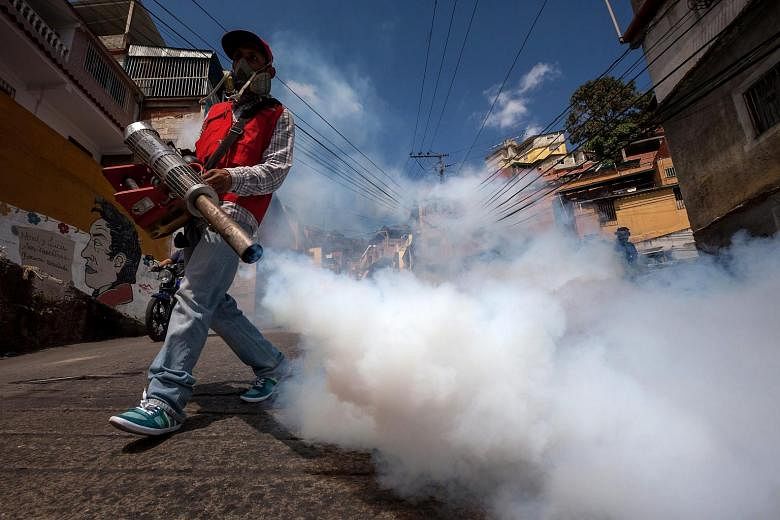CHICAGO/GENEVA • The Zika virus, blamed for a surge in birth defects, is "spreading explosively", World Health Organisation (WHO) chief Margaret Chan said yesterday.
"The level of alarm is extremely high," Dr Chan told a meeting of WHO member states in Geneva, calling for a Feb 1 meeting to determine if the outbreak of the mosquito-borne virus spreading through more than 20 countries in Latin America and the Caribbean qualifies as an international public health emergency.
The world health body said it expected to see three million to four million cases of the virus in the Americas.
Dr Chan said that during previous outbreaks, the virus - which originated in Africa and arrived in Latin America last year - "occasionally caused a mild disease of low concern". But she said "the situation today is dramatically different", highlighting the growing concern that Zika has links to a birth defect known as microcephaly, or an abnormally small head.
"A causal relationship between Zika virus infection and birth malformations and neurological syndromes has not yet been established, but is strongly suspected," she said.
The WHO's response came a day after Brazil - the country hardest hit - vowed to wage a war against the Aedes aegypti mosquito that spreads the virus, focusing on getting rid of the insect's breeding grounds. It also called on its neighbours to unite in fighting the virus as alarm over the virus forced airlines to offer refunds to pregnant mothers afraid to travel to the region.
Brazil's Health Ministry on Wednesday also issued new figures about the virus that offered reason for continued concern - but also a glimmer of hope. The health authorities there said reported cases of microcephaly had climbed to 4,180 since last October, a 7 per cent increase from the previous tally last week. Before the epidemic, Brazil recorded only about 150 cases of microcephaly a year.
Now, officials said they have begun investigating the cases reported more closely. So far, 732 cases have been examined. In 462 of them, either no microcephaly was found, or it was caused by something other than an infection, such as alcohol or drug abuse by the mother during pregnancy, the Health Ministry said.
A spokesman said that congenital infections had caused 270 cases of microcephaly. But in that group, the Zika virus was found in only six infants.
The fact that Zika was found in only six infants with microcephaly since October, however, does not mean that Zika is not causing the broad increase in microcephaly cases, said Dr Artur Timerman, a leading infectious disease specialist in Sao Paulo.
He explained that Brazil's ability to test effectively for Zika remained "very inefficient" because the authorities still lack the most up-to-date methods.
Dr Timerman added that this meant that tests used in Brazil could generally detect Zika in pregnant women or their infants only during the acute phase of the virus, which lasts about five or six days.
Still, he said Brazil's number of suspected cases of microcephaly pointed to a sharp increase.
So far, there is no vaccine or treatment for Zika, which causes mild fever, rash and red eyes. About 80 per cent of people infected have no symptoms, making it difficult for pregnant women to know whether they have been infected.
REUTERS, AGENCE FRANCE-PRESSE, NEW YORK TIMES

